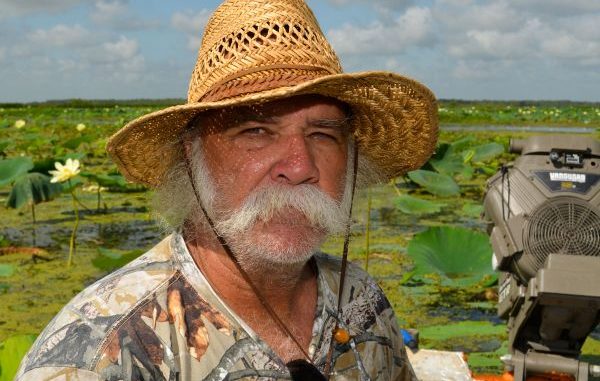
Raymond Joseph “Joey” Fonseca Jr. is a complex man. By vocation, the 61-year-old is a commercial fisherman. By avocation he can be called an articulate philosopher of the wilds.
A few years ago, his wife Georgine, whom everybody knows as Jeanie, began selling some of her husband’s fishing catch at farmers’ markets.
Joey grabbed the fascination of Richard McCarthy, the executive director of Market Umbrella, the group that oversaw the Crescent City Farmers Markets. He fondly dubbed Joey his “Wildman.”
McCarthy was the ultimate urban sophiscate. Fonseca was a creature of the swamps, who looks the part with his huge moustache, brushy eyebrows and sideburns, and cultivated frizz of long hair around his completely bald head — all set off by twinkling hazel eyes.
McCarthy was most impressed by Fonseca’s ability to produce wonderful things to eat from the swamps and marshes.
Fonseca ticked off some of his wild diet not, counting gran à volers: hogs, deer, champignons (aka oyster mushrooms), blackberries, thistle hearts, four kinds of turtles, frogs, rabbits and ducks.
“Pot roasted coon is good,” he added, “and nutria is really good. It’s kind of like armadillo — quite palatable.”
Yes, that’s the word he used.
All day long, he swigged from a bottle of homemade tea made from the leaves of a swamp bay tree.
“All seafood, of course: oysters, shrimp, crabs crawfish,” Fonseca went on. “I love catfish and bluegills, especially chinquapin. Sac-a-lait and bass are even better. I eat dried shrimp for breakfast every other day — my dad’s recipe.”
Father Raymond Sr. was a life-long commercial fisherman, as were all five of his brothers. Joey began fishing slat traps for catfish with his father when he was 15.
Joey and Jeanie have three sons and a daughter, all involved in commercial fishing.
Mark Anthony catfishes, crabs and guides for alligators; Michael Joseph focuses on catfish; Matthew Gabriel is primarily a crabber, but also catfishes; and Monica Theresa delivers seafood for the family business, DOAKK Seafood.
The initials stand for “Des Allemands Outlaw Katfish Kompany.”
“My wife hated that name. The banks and I love it,” Joey Fonseca grinned. “It reflects the heritage of Des Allemands catfish fishermen. We were branded outlaws by the biologists who created the laws.”
He takes perverse pleasure in the name because it beards the catfishermen’s antagonizers.
Wife Jeanie put a positive spin on the name with a slogan for the company: “Our catfish is so darn good that it ought to be against the law.”
“When we created the company, catfish was the main business,” Joey added. “Nowadays, I don’t fish catfish anymore, but we sell and deliver our sons’ catches through the company.”
Fonseca works in a season cycle. From January to June he fishes for crawfish in the Atchafalaya Basin out of Stephensville, driving an hour each way. From June to September he is a crabber.
During September he chases alligators. In October it’s back to crabs for a short period until he begins to shrimp, which he does through November.
December is given over to hunting. He loves to hunt “wild boars” to stock his freezer.
Being on the water is a lot more than a business to the fisherman with the heart of a poet. Partway through picking gran à voler seed pods, he stopped the boat, leaned over slightly, cupped one of the huge flowers in both hands and buried his face in it.
“That’s nose candy,” he said unselfconsciously. “I love it out here. You can call that an understatement. If I could move out here and live ….” he said. “But we all know it’s not like that.
“You can see the seasonal rotation of life. You can see, smell and touch it.”